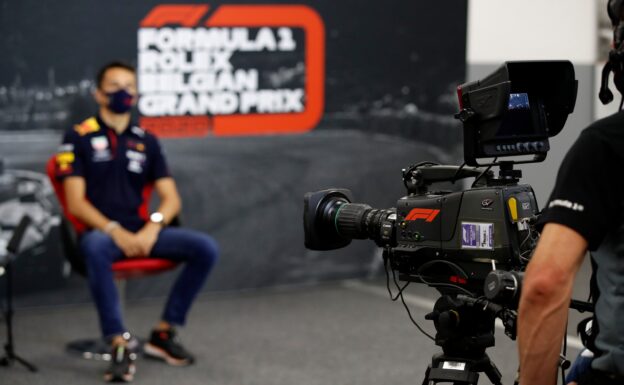In the pitlane - Amazon, Apple & Disney have competition

The recently published Nielsen Sports’ report found interest in F1 was driven by younger audiences galvanised by F1’s social media, Netflix’s drive to survive, and esports.
The research found 77% of the growth came from the 16 to 35 age group, which is equivalent to 46% of F1’s fandom in 2021.
Nielson Sports predict a billion people will be interested in F1 by April 2022.
Stefano Domenicali told investors back in February that, “We saw only a marginal reduction in TV audiences, caused by multiple reasons but clearly driven by a shortened and limited geographical calendar compared to 2019, but something every major sport has experienced in 2020. We are proud of what we delivered in 2020 and know we have an incredibly strong fan base and audience platform to grow in the coming years.”
So as Liberty Media continues to pursue the promised land of digital streaming the giants of Amazon, Apple, and Disney may have a serious competitor in DAZN the global sports subscription service and media company.
DAZN has just launched a 24/7 dedicated Spanish language channel DAZN F1 in Spain after reaching an agreement with Telefonica’s Moviestar+ to broadcast races until the start of 2024.
The channel will have veteran Spanish F1 commentator Antonio Lobato and ex-F1 driver, Pedro de la Rosa, heading up the coverage.
DAZN is already covering most sports and is involved in motorsport covering Indy car, FormulaE, ExtremeE, the Dakar Rally, the World Endurance, and the World Touring car series.
DAZN it is believed have their sights on 20 Spanish speaking countries and the next step will include a Portuguese F1 channel to cover 11 Portuguese speaking countries.
In February DAZN announced its sponsorship of the Scuderia AlphaTauri team for the 2021 season and signed Yuki Tsunoda as a brand ambassador in Japan
DAZN means business and in March 2020 they announced the expansion into 200 countries worldwide with its boxing coverage spearheading the growth.
When Covid-19 struck DAZN suffered the loss of content and an exodus of subscribers from its service which had ironically marketed its cancel anytime policy as a selling point to fans.
The service did launch in December 2020 with an aggressive starting price point of £1.99 for its boxing which will have had the likes of Sky Sports worried.
In April, The Athletic website reported boxing promoter Eddie Hearn had struck a record-breaking nine-figure deal with DAZN, ending an exclusive Sky Sports partnership.
DAZN is ambitious and is not hanging around with the company securing the rights to show seven exclusive Italian Serie A football matches per week in a deal worth $987m per season.
Even with these sums of money involved DAZN co-chief executive James Rushton told SportBusiness that DAZN would make money on the deal stating, “DAZN is a high-growth tech business but the most important thing for me is doing deals on solid and sensible unit economics. I’m not interested in vanity projects or making big splashes in the market that don’t make sense.
“We will make money on Serie A in Italy. No doubt about it.”
Rushton claims the service will be a ‘fans-first model’ by remaining ‘accessible’’ and ‘value priced’.
Not words the F1 fan who watches their sport on free-to-air TV with neither the inclination nor money to watch behind a paywall will want to hear.
Rushton believes the move away from TV is inevitable telling Forbes, “There is a seminal change happening in the balance of power between linear TV and [Over the Top (OTT) providers] where rightsholders recognize the future of their sport is with platforms like DAZN,” he says. “The tipping point has happened.”
DAZN is looking to that new younger audience Liberty is cultivating hoping to attract them with flexible contracts, cheaper subscriptions, and the ability to watch on the device of their choice.
DAZN like the other players in the market need to invest upfront often incurring losses witnessed by a 76% increase in subscribers pre the pandemic but a resulting $1.4 billion loss.
DAZN may not have the financial firepower of the likes of Amazon, Disney, and Apple but it does have deep pockets as it is owned by the multinational industrial group Access Industries best known for its ownership of the Warner Music Group.
As is often the case in F1 a billionaire is involved, step forward Ukraine born but London based Sir Leonard Blavatnik worth $32bn making him Britain richest man ahead of INEOS boss and Mercedes team shareholder Sir James Ratcliffe at $17bn.
Blavatnick gained control of the DAZN group back in 2014 when Access Industries increased its stake in the company from 42.5% to 77%.
Blavatnick like fellow billionaire Dmitry Mazepin made his first fortune during the ‘privatisation’ of Russian state assets selling his stake in Russian oil company TNK-BP for $7 billion back in 2013.
Blavatnick as the 46th richest man on the planet has all the billionaire playthings owning the obligatory $80m 242 ft superyacht Odessa 11 and no less than 4 private jets including a $150m Boeing 767.
He is also a philanthropist having pledged over $700m mostly to universities, including Oxford, Stanford, and Harvard.
Time will tell who will win the battle for F1’s coverage but no doubt as always the case in F1, cash will be king.
Disclaimer:
The opinions expressed are those of the author's and do not necessarily reflect the opinions or views of F1-Fansite.com, staff or partners.
✅ Check out more posts with related topics:













LAST 3 F1 Fan COMMENTS